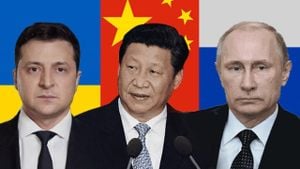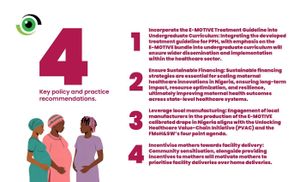LONDON, Nov 7 (Reuters) - The British government has announced its most extensive sanctions package against Russia in 18 months, targeting individuals associated with the infamous Wagner mercenary group along with various entities across several African countries.
This latest series of sanctions, totaling 46 new measures, aims to disrupt what officials describe as Russia's malign activities globally. These measures come as the UK seeks to exert pressure on President Vladimir Putin’s war efforts following the invasion of Ukraine.
Among those sanctioned are individuals linked to the Wagner group, which has garnered widespread scrutiny for its operations not just within Russia but also across Africa, particularly affecting nations like the Central African Republic, Libya, and Mali. This pattern of behavior has raised alarms internationally, prompting calls for accountability.
British Foreign Minister David Lammy emphasized the UK’s commitment to undermining Russia’s foreign policy. “Today's measures will continue to push back on the Kremlin's corrosive foreign policy, undermining Russia's attempts to destabilize across Africa,” he stated. Lammy pointed to the targeted entities as part of Russia's attempt to establish military capabilities overseas, effectively reshaping the geopolitical balance.
The sanction spree also includes action against firms based in China, Turkey, and Kazakhstan. These collaborations reportedly involve supplying machinery and strategic technologies to aid Russia's military ambitions. British intelligence suggests some of these companies could be connected to efforts to circumvent sanctions imposed after the Ukraine conflict.
Beyond targeting business associations, this sanctions bundle aims to hold accountable those responsible for heinous acts, including the controversial use of chemical agents. A new designation has been made under the chemical weapons sanctions regime, highlighting the urgency and seriousness of the UK’s stance against such threats.
Among the sanctioned individuals is Denis Sergeev, identified by British police as one of the operatives involved in the poisoning of former Russian double agent Sergei Skripal and his daughter Yulia with the lethal nerve agent Novichok. The Novichok incident, which occurred back in March 2018, led to significant diplomatic fallout between the UK and Russia, with accusations of state-sponsored assassination attempts being levied against the Kremlin.
The repercussions of this new wave of sanctions are expected to resonate not just on the UK-Russia front but also within the broader international community. By aligning with allies and taking definitive action against the Wagner group and its affiliates, the UK aims to assert its position on the global stage.
These sanctions come at a time when relations between London and Moscow are at their lowest, largely due to Russia's aggressive military engagements. The UK's response is part of coordinated strategies with allies, including the United States and other Western nations, aiming to isolate Russia economically and politically.
Looking forward, the impact of these sanctions remains to be seen. Experts suggest they could have significant effects on the operational logistics of the Wagner group and its affiliates, limiting their capacity to mobilize forces and resources effectively.
While Britain’s approach can draw criticism and calls for strategic re-evaluation, today’s moves reflect the UK government’s determination to confront threats and hold accountable those implicated in international violations.



